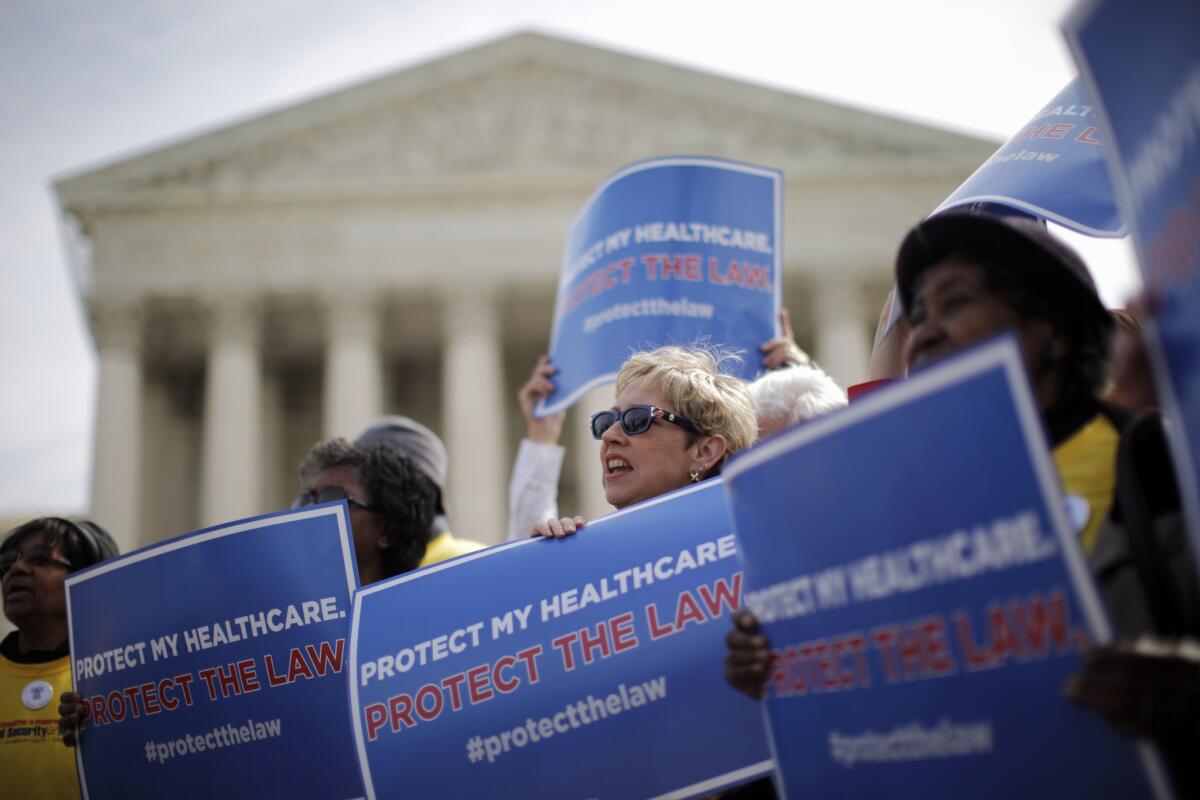Opinion: The Supreme Court gives itself a second chance to kill Obamacare

How many times can Obamacare cheat death at the Supreme Court?
The justices announced Friday that they will take up the case of King v. Burwell, which challenges the Obama administration’s decision to make insurance subsidies available to low- and moderate-income Americans in all 50 states. If the plaintiffs prevail, subsidies will be cut off for residents in the states that did not set up their own insurance-buying exchanges.
Such a ruling could be catastrophic to the 2010 Patient Protection and Affordable Care Act. Not only would it render insurance unaffordable to millions of Americans in 34 states that didn’t establish exchanges, it would exempt large employers in those states from the mandate to provide affordable coverage to their full-time workers.
Whether the ACA could survive the ruling is another question. Unlike the requirement that all adult Americans buy coverage, the mandate on large employers isn’t essential to the ACA. And while it would be grossly unfair to provide subsidies to some lower-income Americans but not others based solely on the whims of their state legislatures, the law at least exempts people from the requirement to buy insurance if the premiums would amount to more than 8% of their income.
Still, in a rational world, Congress would have amended the law already to remove any ambiguity about its intention to make federal subsidies available in every state. But that wasn’t a possibility, and won’t be going forward, as long as Republicans oppose any change to the ACA that could reduce the chances of repealing it someday.
The plaintiffs in King and similar lawsuits in other courts are low-income individuals who say that they don’t want to buy health insurance and would be exempt from the mandate to do so if not for the availability of subsidies. To rationalize the absurdity of their position, they argue that they’re more concerned about federal taxpayers and the deficit than they are about potentially ruinous medical bills. Joining them in the lawsuits are businesses that don’t want to comply with the law’s mandate to provide coverage.
The claims by King et al. would be laughable if not for the wording of the ACA’s provision governing how to calculate the size of a person’s subsidy. That provision bases the subsidies in part on the premiums for plans “enrolled in through an exchange established by the state.” A three-judge panel at the Court of Appeals for the District of Columbia ruled in July that this provision limited subsidies to states that set up their own exchanges. Later the same day, a three-judge panel in the 4th Circuit came to the opposite conclusion in the King case, finding that other provisions of the ACA made it clear that Congress intended federally run exchanges to be perfect substitutes for state-established ones. With the full D.C. Circuit vacating the panel’s ruling pending a rehearing, subsidies continue to flow to qualifying consumers nationwide.
I’ve written several times about the evidence showing Congress clearly intended to make subsidies broadly available (a point that a number of readers do not concede), as well as the revisionist history advanced by the plaintiffs. The legal issue here, though, is just how much latitude the administration has to interpret statutes. The Supreme Court has previously held that courts should defer to the agencies’ interpretation of vague laws, and that the various provisions of an act need to be read in the context of the law as a whole. But the justices have also made it clear that agencies don’t have the authority to rewrite clear statutory text to fix inconsistencies or errors.
It’s possible that the four (or more) justices who voted to hear King’s appeal wanted to reiterate the position taken by the D.C. Circuit panel, namely, that the disputed provision of the ACA is so clear that the administration cannot interpret it as anything but a ban on subsidies in states that haven’t set up their own exchanges. It’s also possible that the court wanted to use the case to clarify the circumstances under which an agency can stray from the apparent meaning of the statutory text.
Whatever the rationale, the fact that the court took the case against the administration’s advice and before the D.C. Circuit has acted is a sign of trouble for the ACA.
The left-leaning Constitutional Accountability Center blasted the justices’ decision to hear King’s appeal. “The fact remains that this is a straightforward case about how we interpret statutes in this country,” said Elizabeth Wydra, the center’s chief counsel. “No elected official in Congress or in the state legislatures at the time the ACA was passed held the view that the challengers are pushing today, and the members of Congress who shaped and drafted the law have gone on record in briefing in this case to set the record straight.
“The challengers’ view isn’t in the text of the ACA and it runs directly contrary to the purpose of the law, making sure every American has access to affordable health insurance. This challenge to the ACA gravely misconstrues the law, while threatening to leave millions of Americans without access to health care.”
If the court sides with King, the damage to the ACA would be considerable. At the very least, it would give Republicans more ammunition for their efforts to repeal the law and replace it with a more market-oriented approach to controlling costs and expanding access to coverage. But then, they’ll be fighting that battle regardless of what the court does.
Follow Healey’s intermittent Twitter feed: @jcahealey
More to Read
Sign up for Essential California
The most important California stories and recommendations in your inbox every morning.
You may occasionally receive promotional content from the Los Angeles Times.










